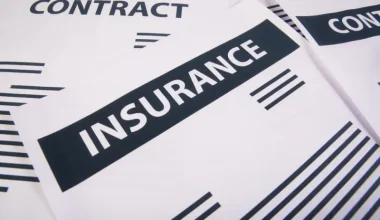Umbrella insurance extends your coverage beyond your existing insurance policies, such as homeowners and auto insurance. If someone is injured on your property and sues you, umbrella insurance can assist in safeguarding your assets, such as your house and investment accounts, and can also cover legal bills that exceed the limits specified by your other insurance policies. If you are sued for libel or slander, umbrella insurance can help cover your legal bills and expenses.
Here’s all you need to know about umbrella insurance and whether you need it.
What is Umbrella Insurance?
An umbrella insurance policy provides additional liability coverage that exceeds the limitations of the insured’s homes, vehicles, or watercraft insurance. It adds an extra layer of protection to people who are at risk of being sued for damages to other people’s property or injuries caused by an accident. It also provides protection from libel, vandalism, slander, and invasion of privacy.
How Umbrella Insurance Works?
You may be interested in seeing personal umbrella insurance in action now that you understand what it is. Here are some examples of how an umbrella policy could be used:
- In a car accident, you hurt someone. Assume you create a car accident that causes serious injury to the other party. If you have $100,000 in bodily injury liability per person on your auto policy, but their total injuries are $175,000, your umbrella policy may step in to pay the $75,000 overage, allowing you to avoid paying out of pocket.
- Someone drowns in your swimming pool. If someone is wounded or drowns in your swimming pool, the financial costs might be catastrophic. Most house insurance policies contain $100,000 to $300,000 in personal liability coverage, but an umbrella policy may give additional protection in situations such as pool injuries.
- You do harm to a rental home: Assume you rent a vacation home and fail to properly extinguish the bonfire you enjoyed on the terrace. If your actions cause a fire that damages the house, your home insurance policy and your umbrella policy may cover the costs.
Except in some circumstances where coverage isn’t accessible from your underlying policy but covered by an umbrella policy, you’ll rarely submit a claim for a new occurrence straight on your umbrella policy. You will typically submit a claim on the insurance policy that covers the incident first, whether it is for your car, home, or something else.
What Is the Purpose of Umbrella Insurance?
You’re saying to yourself, “I have auto and homeowners insurance that covers some of these situations.” True! However, umbrella insurance insures you over and above the limitations of those policies and covers some scenarios that the other types of policies do not cover.
What Does Umbrella Insurance Cover?
Umbrella insurance covers a wide range of issues and provides monies in excess of the limits of your other policies, such as vehicle or house insurance.
Your umbrella insurance policy should cover members of your household, such as your husband and children.
For issues like these, umbrella insurance offers liability coverage:
- Other people’s bodily harm
- Others’ property damage
- The cost of legal representation in disputes involving these issues
- Defamation, libel, slander, and invasion of privacy lawsuits
- Incidents that occur outside of the U.S.
Umbrella Protection In addition to the Standard Insurance Policy
Another benefit of umbrella insurance is that it typically provides coverage that is not included in a standard vehicle or homeowners policy. As an example:
- False arrest, incarceration, or detention
- wrongful prosecution
- Incorrect eviction or entry
- Privacy invasion
What Does Umbrella Insurance Not Cover?
Umbrella insurance does not cover your personal injuries or property damage. Other issues that are often not covered by umbrella insurance include:
- Business Losses
- You have committed criminal acts.
- Contracts might be written or oral.
- Intentional actions or injury committed by you
- Nuclear radiation, conflict, or terrorism damage
- A communicable condition, such as a lawsuit filed against you for infecting someone with herpes
What Kind of Umbrella Insurance Do I Need?
There are several factors to consider while determining the appropriate level of coverage.
- Your assets’ worth: An umbrella policy should cover at least your net worth—what you stand to lose in a lawsuit.
- Income loss in the future: A large lawsuit could potentially jeopardize your future earnings. Consider your prospective future income even if you have a low current income. For example, if you are a medical student, you should think about your future earnings potential.
A lengthy legal proceeding is stressful and can potentially harm a reputation, regardless of whether the action was frivolous or not. Purchasing an umbrella policy will not alleviate your tension, but it will protect all you’ve fought so hard to build.
How Much Is Umbrella Insurance?
The cost of an umbrella liability policy is determined by the amount of coverage purchased, the location in which you live (insurance rates vary by state), and the risk that insuring you presents to the insurance provider. The more residences or cars you own, as well as the number of household members your policy must cover, the higher the cost.
According to the Insurance Information Institute, most $1 million policies cost $150 to $300 per year. Expect to pay roughly $75 more per year for $2 million in coverage, and another $50 per year for each additional $1 million in coverage. The majority of insurance firms’ umbrella liability policies begin at $1 million in coverage, with higher amounts available.
Umbrella Insurance Comparison to Other Insurance
Umbrella insurance is quite inexpensive when compared to other types of insurance, especially given the amount of coverage it provides. This is due to the fact that you must have a substantial amount of homeowner’s and auto insurance before an insurance company will offer you an umbrella policy. In fact, you’ll almost certainly need to carry the maximum liability coverage offered under these policies before you can buy an umbrella policy.
The majority of Americans already have at least $100,000 in homeowner’s insurance coverage. Minimum liability coverage for auto insurance varies by state, but it is normally $25,000 per person and $50,000 per accident. Under your homeowner’s policy, the most you can normally buy is $500,000 in personal liability $250,000 per person, and $500,000 per accident under your auto insurance policy.
If you don’t already have this level of coverage, your homeowner’s and auto insurance rates will rise. This will make the umbrella policy more expensive than it appears at first glance.
Buying Umbrella Insurance
Umbrella insurance is frequently sold by insurers who also sell auto, home, and watercraft insurance. Typically, the company that offers your auto and/or homeowners insurance is the one you’ll need to purchase umbrella insurance from. People who get renters insurance can also purchase umbrella insurance.
Umbrella insurance is offered by the following companies:
- Allstate
- American Family
- Auto-Owners
- Chubb
- Country Financial
- Erie Insurance
- Farmers
- Nationwide
- Progressive
- Shelter
- State Farm
- Travelers
- USAA (available only to military members, veterans, and their families)
- Westfield
Even if you do not purchase umbrella insurance, you may be eligible for a bundling discount if you purchase your house and insurance from the same carrier.
Is Umbrella Insurance a Good Buy?
If you require liability coverage that extends beyond what your standard auto or home insurance policies provide, an umbrella insurance policy might be an ideal addition to your insurance portfolio. Umbrella insurance is a good strategy to cover your net worth in case you are sued. A $1 million umbrella insurance policy costs roughly $32 per month.
Without umbrella insurance, you risk losing assets such as your home and bank accounts if you are judged liable for other people’s injuries or property damage. For example, if you cause a serious vehicle accident and your liability insurance is insufficient to cover a judgment against you, you could file a claim under an umbrella policy.
If you don’t have many assets and can’t afford the higher vehicle and home insurance limits required for umbrella insurance, an umbrella policy is probably not for you.
What Is the Difference Between Umbrella Insurance and Excess Liability Insurance?
Yes, umbrella insurance is frequently used to refer to excess liability insurance.
If you have assets that exceed the limits of your house and car insurance policies, you may benefit from additional coverage in the event that you cause damage or injury to someone else that exceeds the coverage limitations of your base policy.
What Is the Maximum Amount That Umbrella Insurance Will Pay?
Your umbrella insurance will only pay up to the policy limit.
For example, if you have a $1 million umbrella insurance policy and are held liable in a lawsuit, your umbrella insurance will only pay up to the value of your policy. Umbrella insurance is typically purchased in $1 million increments, such as a $10 million umbrella insurance policy.
Is Property Damage Covered by Umbrella Insurance?
Umbrella insurance normally covers you if you are responsible for causing damage to other people’s property, but it does not cover damage to your own possessions. Assume you cause more damage to other vehicles than your auto liability coverage will cover. Your umbrella policy would cover the difference, but it would not cover repairs to your own vehicle.
Are Dog Bites Covered by Umbrella Insurance?
If your dog bites someone, the first place you’d look is your homeowners, renters, or condo insurance policy to cover any claims or legal fees. However, if the costs exceed the policy’s liability limit, your umbrella policy may give further coverage. Keep in mind that certain insurance companies will not cover specific dog types or sizes.
Does Having Children Increase Liability Risk?
Having or frequently caring for children may be an overlooked issue in deciding on umbrella coverage. Whether you have one or several children, the inherent liability risk that comes with having children of any age implies that parents, guardians, and caretakers may wish to consider an umbrella policy. Vicarious liability holds parents and guardians legally and financially liable for their children’s acts. Here are a few instances where an umbrella policy may be beneficial:
- Your young child pushes another youngster off the park’s slide, inflicting serious injury.
- Your older child makes defamatory comments on a social media platform, inflicting emotional distress or disgrace to another child.
- While you are away, your teen hosts a house party and provides booze. Due to underage drinking and driving, a partygoer is hurt or murdered on the way home.
Should I Get Umbrella Coverage if My House Includes a Pool?
Swimming pools, fire pits, hot tubs, and treehouses may raise your liability risk. If a guest is injured in your house, you may need enough liability coverage to protect yourself if you are found to be liable. If your medical expenditures and legal fees exceed the liability limit on your homeowners’ policy, umbrella insurance may assist in covering them.
Is Liability Coverage the Same as an Umbrella Insurance Policy?
Liability protection is provided by both liability coverage and an umbrella insurance policy. An umbrella, on the other hand, is its own policy, whereas liability coverage is a component of a broader policy. The umbrella insurance policy is normally used only when the underlying liability coverage on your home, auto, or other insured policy has been exhausted. However, an umbrella policy may be used in situations where the underlying policy does not provide coverage, such as personal injury. The umbrella insurance policy supplements your other insurance policies by providing a second layer of liability protection.
Can I Obtain Umbrella Insurance for My Company?
Yes, business umbrella insurance is available. Because business umbrellas work similarly to personal umbrellas in that the coverage only kicks in once the liability limit on the underlying policy is exhausted, you’ll almost certainly need to obtain additional forms of business insurance as well. Many of the finest home and auto insurance providers also offer business insurance, which may make getting a quotation and managing your policies easier.
Conclusion
A personal liability case can leave even the most diligent individual with the best intentions on the hook for a large financial judgment. While you are unlikely to be in this circumstance, it is prudent to protect yourself from such a potentially terrible financial loss. Umbrella insurance can assist you in accomplishing this.
- Vendors Insurance: Protect Yourself and Your Business
- Professional Liability Insurance: A Guide for Professionals
- Best Workers Compensation Insurance Of 2023
- Product Liability Insurance: Everything You Need to Know
- PERSONAL LINES INSURANCE: What Is It & How Does It Work?






